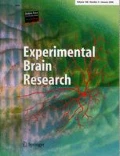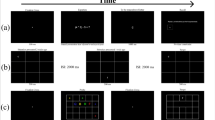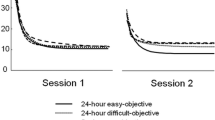Abstract
The influence of sleep on motor skill consolidation has been a research topic of increasing interest. In this study, we distinguished general skill learning from sequence-specific learning in a probabilistic implicit sequence learning task (alternating serial reaction time) in young and old adults before and after a 12-h offline interval which did or did not contain sleep (p.m.–a.m. and a.m.–p.m. groups, respectively). The results showed that general skill learning, as assessed via overall reaction time, improved offline in both the young and older groups, with the young group improving more than the old. However, the improvement was not sleep-dependent, in that there was no difference between the a.m.–p.m. and p.m.–a.m. groups. We did not find sequence-specific offline improvement in either age group for the a.m.–either p.m. or p.m.–a.m. groups, suggesting that consolidation of this kind of implicit motor sequence learning may not be influenced by sleep.


Similar content being viewed by others
References
Albouy G, Sterpenich V, Balteau E, Vandewalle G, Desseilles M, Dang-Vu T, Darsaud A, Ruby P, Luppi PH, Degueldre C, Peigneux P, Luxen A, Maquet P (2008) Both the hippocampus and striatum are involved in consolidation of motor sequence memory. Neuron 58:261–272
Barnes KA, Howard JH Jr, Howard DV, Gilotty L, Kenworthy L, Gaillard WD, Vaidya CJ (2008) Intact implicit learning of spatial context and temporal sequences in childhood autism spectrum disorder. Neuropsychology 22:563–570
Bennett IJ, James H, Howard J, Howard DV (2007) Age-related differences in implicit learning of subtle third-order sequential structure. J Gerontol Psychol Sci 62(B):98–103
Curran T (1997) Effects of aging on implicit sequence learning: accounting for sequence structure and explicit knowledge. Psychol Res 60:24–41
Doyon J, Bellec P, Amsel R, Penhune V, Monchi O, Carrier J, Lehericy S, Benali H (2009a) Contributions of the basal ganglia and functionally related brain structures to motor learning. Behav Brain Res 199:61–75
Doyon J, Korman M, Morin A, Dostie V, Hadj Tahar A, Benali H, Karni A, Ungerleider LG, Carrier J (2009b) Contribution of night and day sleep versus simple passage of time to the consolidation of motor sequence and visuomotor adaptation learning. Exp Brain Res 195:15–26
Fischer S, Hallschmid M, Elsner AL, Born J (2002) Sleep forms memory for finger skills. PNAS 99:11987–11991
Frensch PA, Miner CS (1994) Effects of presentation rate and individual differences in short-term memory capacity on an indirect measure of serial learning. Mem Cognit 22:95–110
Hikosaka O, Nakahara H, Rand MK, Sakai K, Lu X, Nakamura K, Miyachi S, Doya K (1999) Parallel neural networks for learning sequential procedures. TINS 22:464–471
Hikosaka O, Nakamura K, Sakai K, Nakahara H (2002) Central mechanisms of motor skill learning. Curr Opin Neurobiol 12:217–222
Howard DV, Howard JH Jr (1989) Age differences in learning serial patterns: direct versus indirect measures. Psychol Aging 4:357–364
Howard DV, Howard JH (1992) Adult age differences in the rate of learning serial patterns: evidence from direct and indirect tests. Psychol Aging 7:232–241
Howard JH Jr, Howard DV (1997) Age differences in implicit learning of higher-order dependencies in serial patterns. Psychol Aging 12:634–656
Howard DV, Howard JH Jr, Japikse K, DiYanni C, Thompson A, Somberg R (2004a) Implicit sequence learning: effects of level of structure, adult age, and extended practice. Psychol Aging 19:79–92
Howard JH Jr, Howard DV, Dennis NA, Yankovich H, Vaidya CJ (2004b) Implicit spatial contextual learning in healthy aging. Neuropsychology 18:124–134
Krakauer JW, Shadmehr R (2006) Consolidation of motor memory. Trends Neurosci 29:58–64
Remillard G (2008) Implicit learning of second-, third-, and fourth-order adjacent and nonadjacent sequential dependencies. Q J Exp Psychol (Colchester) 61:400–424
Robertson EM, Pascual-Leone A, Press DZ (2004) Awareness modifies the skill-learning benefits of sleep. Curr Biol 14:208–212
Robertson EM, Press DZ, Pascual-Leone A (2005) Off-line learning and the primary motor cortex. J Neurosci 25:6372–6378
Schendan H, Searl M, Melrose R, Stern C (2003) An FMRI study of the role of the medial temporal lobe in implicit and explicit sequence learning. Neuron 37:1013–1025
Siengsukon CF, Boyd LA (2009a) Does sleep promote motor learning? Implications for physical rehabilitation. Phys Ther 89:370
Siengsukon CF, Boyd LA (2009b) Sleep to learn after stroke: implicit and explicit off-line motor learning. Neurosci Lett 451:1–5
Siengsukon CF, Siengsukon CF, Boyd LA (2008) Sleep enhances implicit motor skill learning in individuals poststroke. Top Stroke Rehabil 15:1
Soetens E, Melis A, Notebaert W (2004) Sequence learning and sequential effects. Psychol Res 69:124–137
Song S (2009) Consciousness and the consolidation of motor learning. Behav Brain Res 196:180–186
Song S, Howard JH Jr, Howard DV (2007) Sleep does not benefit probabilistic motor sequence learning. J Neurosci 27:12475–12483
Spencer RM, Sunm M, Ivry RB (2006) Sleep-dependent consolidation of contextual learning. Curr Biol 16:1001–1005
Spencer RM, Gouw AM, Ivry RB (2007) Age-related decline of sleep-dependent consolidation. Learn Mem 14:480–484
Stickgold R, Malia A, Maguire D, Roddenberry D, O’Connor M (2000) Replaying the game: hypnagogic images in normals and amnesics. Science 290:350–353
Walker MP, Brakefield T, Morgan A, Hobson JA, Stickgold R (2002) Practice with sleep makes perfect: sleep-dependent motor skill learning. Neuron 35:205–211
Acknowledgments
This research was supported by Bolyai Scholarship Program and OTKA F 61943. Thanks to Ildikó Vízi and Anna Rácz for their valuable assistance during data collection, and Gábor Csifcsák for his help.
Author information
Authors and Affiliations
Corresponding author
Additional information
All authors contributed equally to this work.
Rights and permissions
About this article
Cite this article
Nemeth, D., Janacsek, K., Londe, Z. et al. Sleep has no critical role in implicit motor sequence learning in young and old adults. Exp Brain Res 201, 351–358 (2010). https://doi.org/10.1007/s00221-009-2024-x
Received:
Accepted:
Published:
Issue Date:
DOI: https://doi.org/10.1007/s00221-009-2024-x




